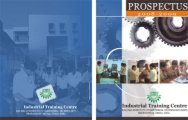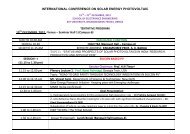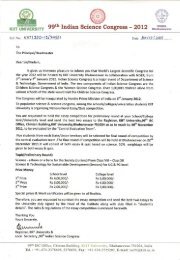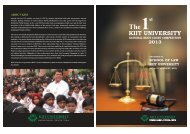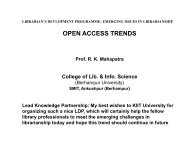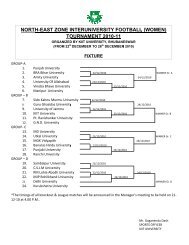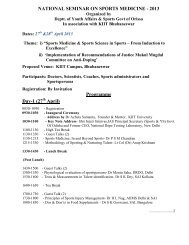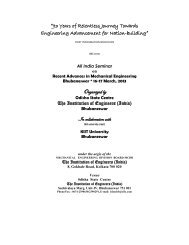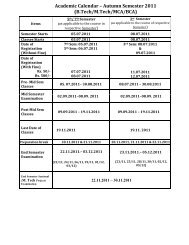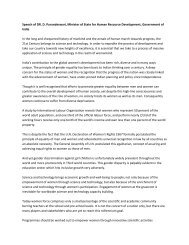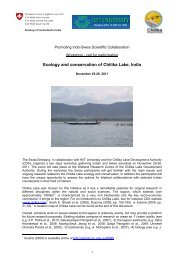PANEL ORGAN - KIIT University
PANEL ORGAN - KIIT University
PANEL ORGAN - KIIT University
You also want an ePaper? Increase the reach of your titles
YUMPU automatically turns print PDFs into web optimized ePapers that Google loves.
alia the expectations of the role or influence the KSELC would have in the promotion of<br />
awareness in indigenous matters. The data obtained during the survey will be presented<br />
and interpreted in this contribution.<br />
DINERO, Steven C, Human Geography, College of Science, Health and the Liberal Arts,<br />
Philadelphia <strong>University</strong> School House Lane & Henry Avenue Philadelphia, PA 19144 USA<br />
215-951-2608, E-mail: <br />
Education and Youth Development in an Alaska Native Community: Costs and Benefits<br />
The Khoekhoe and San are the indigenous peoples of South Africa. In 2010, the<br />
Department of Anthropology at the <strong>University</strong> of the Free State launched a Khoekhoe and<br />
San Early Learning Centre (KSELC) in Heidedal. The main objectives of the KSELC are to<br />
assist indigenous people who wish to revitalise and develop their Khoekhoe language skills,<br />
and to create a teaching environment that will respect the Khoekhoe and the San’s<br />
heritage and culture. Before the opening of the KSELC, research was conducted in terms<br />
of a pre-testing and post-testing research design. This was done through a survey of inter<br />
alia the expectations of the role or influence the KSELC would have in the promotion of<br />
awareness in indigenous matters. The data obtained during the survey will be presented<br />
and interpreted in this contribution.<br />
RADAELLI, Isabella, Anthropology of Contemporary Milano Bicocca <strong>University</strong>, Italy,<br />
Education Programs for Chinese Ethnic Minorities, E-mail: <br />
From Theories to Practices - A Case Study among the Mosuo Matrilineal Society<br />
The Gwich’in Indians of northeast Alaska are undergoing a period of transition. The youth<br />
differ greatly from the previous generations in terms of values and behaviors. An inability<br />
to speak Gwich’in, interest in material goods, and consumption of fewer country foods are<br />
now common among the younger generations. At the same time formal education rates<br />
are on the rise. Using primary data collected from 1999 to 2012 in one community, Arctic<br />
Village, this paper will address how education benefits as well as undermines Indigenous<br />
values and culture. While education is crucial in empowering young community members,<br />
enabling many to eventually enter wage labor, improving their ability to afford the costly<br />
monetary inputs now needed to hunt, fish and gather, many, once educated, leave the<br />
community in search of opportunities in urban centers. Thus formal education of Gwich’in<br />
youth is a double-edged sword, essential to the community’s future well-being yet also<br />
posing a potential threat to its long-term viability<br />
ANITHA, J., Gandhigram Rural Institute-Deemed <strong>University</strong>, Gandhigram-624302, Dindigul<br />
District, Tamil Nadu, India, E-mail: <br />
Educating the Paliya Tribe on the Lower Palni Hills of Western Ghats in Tamil Nadu<br />
The Chinese Government has recently put great efforts into improving the educational<br />
conditions of the Country, trying to bring a better learning environment also to areas of<br />
ethnic minorities. Thanks to the education policies and programs, most ethnic<br />
autonomous regions have been authorized to develop special curriculum focusing on their<br />
own ethnic languages and customs. Benefits for rural education were increased, allowing<br />
more families to send their children to school. Despite the promotion of the ‘two basics’,<br />
consisting of a nine-year compulsory education program (six years of primary school and<br />
three years of middle school) and the eradication of illiteracy among youth and middleaged<br />
people, Governmental efforts have not succeeded in implementing a universal<br />
primary education or a qualified teaching environment to rural areas. In this paper I will<br />
first try to outline the education policies of different ethnic minority groups in the Yunnan<br />
area; I will then focus on the case of Mosuo people, a small ethnic group living in



